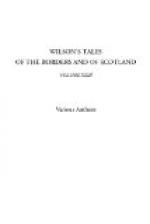So the penitence of Mr. Thomas Dodds might be a very
dear affair after all, in so much as terror is a condition
of the soul which, of all we are doomed to experience,
is the most difficult to bear, especially if it is
a terror of divine wrath. On his return to his
house in the evening, he found that Mrs. Mary had
taken him at his word and decamped, but not without
providing herself with as good a share of the “goods
in communion” as she could, perhaps, at two or
three returns, carry off. So was she like Zebulun
in all save her righteousness, for she “rejoiced
in her going out;” nay, she had some reason,
for she had discovered that in a secret drawer of
an old cabinet there was a pose of gold collected
by the industrious hands of Mrs. Janet, and unknown
to her husband, every piece of which she carried off
in spite of all fear of the spectre, which, if a sensible
one, might have been supposed to be more irritated
at this heedless spoliation than at all the Jezebel
had yet done, with the exception of the counselling
her death in the deep hole of the North Loch.
On seeing all this robbery, Mr. Dodds became more
and more aware of the bad exchange he had made by killing
his good spouse to enable him to take another, who
had merely found more favour in his eyes by reason
of her good looks; and we may augur how much deeper
his feeling of regret would have been, had he known
the secret pose, so frugally and prudently laid up,
perhaps for his sake, at least for the sake of both,
when disease or old age might overtake them, in a
world where good and evil, pleasure and pain, appear
to be fixed quantities, only shoved from one to another
by wisdom and prudence, yet sometimes refusing to
be moved even by these means.
After satisfying himself of the full extent of the
robbery, which, after all, he had brought upon himself,
and very richly deserved, he sat down upon a chair
and began to moralize, after the manner of those late
penitents who have found themselves out to be either
rogues or fools—the number of whom comprehends,
perhaps, all mankind. He had certainly good reason
to be contrite. The angel in the house had become
a spectre, and she who was no angel, either in the
house or out of it, had carried off almost everything
of any value he possessed. Nor did he stop at
mere unspoken contrition, he bewailed in solemn tones
his destiny, and then began to cast up all the perfections
of good Janet, the more perfect and beautiful these
seeming in proportion as he felt the fear of her reappearance,
perhaps next time, in place of making his breakfast,
to run away with him to the dire place of four letters.
All her peculiarities were now virtues—nay,
the very things which had appeared to him the most
indefensible took on the aspect of angelic endowments.
While her careful housewifery was all intended for
his bodily health and comfort, her perseverance in
adhering to the one chapter and the one psalm was
due to that love of iteration which inspires those




